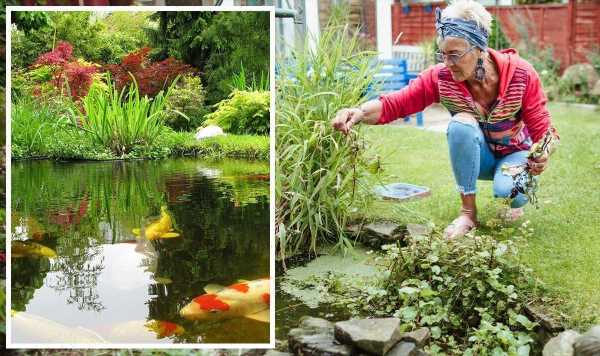BBC weather: Temperatures building day on day amid heatwave
We use your sign-up to provide content in ways you’ve consented to and to improve our understanding of you. This may include adverts from us and 3rd parties based on our understanding. You can unsubscribe at any time. More info
Amber heat warnings are in place across much of the southern half of England and parts of Wales as temperatures build to the mid 30s on Saturday, according to the Met Office. As the hot weather continues, pond owners should take extra precautions when planting, feeding and maintaining the water in their pond, but what exactly do you need to do? Here’s how to keep your fish pond plants healthy during a heatwave, according to the experts as Practical Fishkeeping.
Ponds are relatively easy to maintain throughout the year though the can become harder to keep healthy in the heat of summer.
Not only are plants at risk of dying in the unusual weather, but fish can also suffer, despite living beneath the surface of the water.
The experts at Practical Fishkeeping said: “The hot weather can cause problems for pond owners due to a phenomenon known as summer fish kill.
“The problem is caused by low levels of dissolved oxygen in the pond water, and fish usually die early in the morning, with mainly larger fish being affected.”
How to prevent summer fish kill
In dry, hot periods, water is capable of holding less dissolved oxygen than at cooler temperatures.
If a pond has large numbers of fish, organic wastes, or aquatic plants in the pond, oxygen levels can quickly “plummet to dangerous levels”, according to Practical Fishkeeping.
For this reason, it is crucial to take precautions to prevent it from happening.
There are a few ways to ensure your pond is balanced and healthy during a heatwave, the most important of which is to keep the water temperature down and oxygen levels high.
Improve the water circulation
Water circulation is essential for keeping the temperature low and oxygen on the rise, but it does mean that pumps and fountains should be kept on both and night.
Even in very hot conditions, many fish keepers switch pumps off at night, though Practical Fishkeeping has warned that this is how many pond owners lose their fish.
Instead, they recommended keeping it on for 24 hours a day during the hottest periods.
Even if you think your plant is full of oxygen-rich plants, the pump is still required throughout the day and night.
Practical Fishkeeping said: “Because oxygenating plants and algae produce oxygen during the day and consume oxygen at night, don’t be tricked into thinking that you don’t need to ensure adequate aeration just because your pond is rich in plant growth.
“It should help keep your fish alive by leaving the pump running all night and day, but you may end up annoying the neighbours a little!”
DON’T MISS:
‘Best time’ to water plants during heatwave – correct technique [INSIGHT]
‘Worst times’ to pot new plants – leads to ‘soil losing moisture’ [REVEAL]
BBC Weather: UK’s extreme amber warning heatwave set for peak [LATEST]
Avoid feeding
Fish require similar care to plants during a heatwave and the same applies to your feeding schedule.
According to the experts, fish keepers should avoid feeding their fish “heavily” on the hottest days.
This is because feeding can lead to increased metabolism and higher oxygen demand, which reduces the levels in the confines of the pond.
Try to avoid feeding during these periods and feed in the cooler parts of the evening instead.
Control pond plants
Pruning back excess growth is a quick way to increase aeration and circulation in your pond.
The reason for this is that although oxygenating plants help during the day, they consume oxygen at night making conditions in the pond even worse for the fish.
The experts at practical Fishkeeping also recommended keeping algae under control as it consumes oxygen from the water during the night.
Create shade
Moving a garden pond is not an option, however, it is possible to create shade to block our direct sunlight and prevent the water from overheating
Swell UK recommended tying a garden sail over the pond to create temporary shade during the daytime, or better still, building a pergola for a long-term solution.
They said: “Shade your pond and you will get less algae, as well as make it less visible to herons, and less accessible if they want to fly in.”
Source: Read Full Article




